
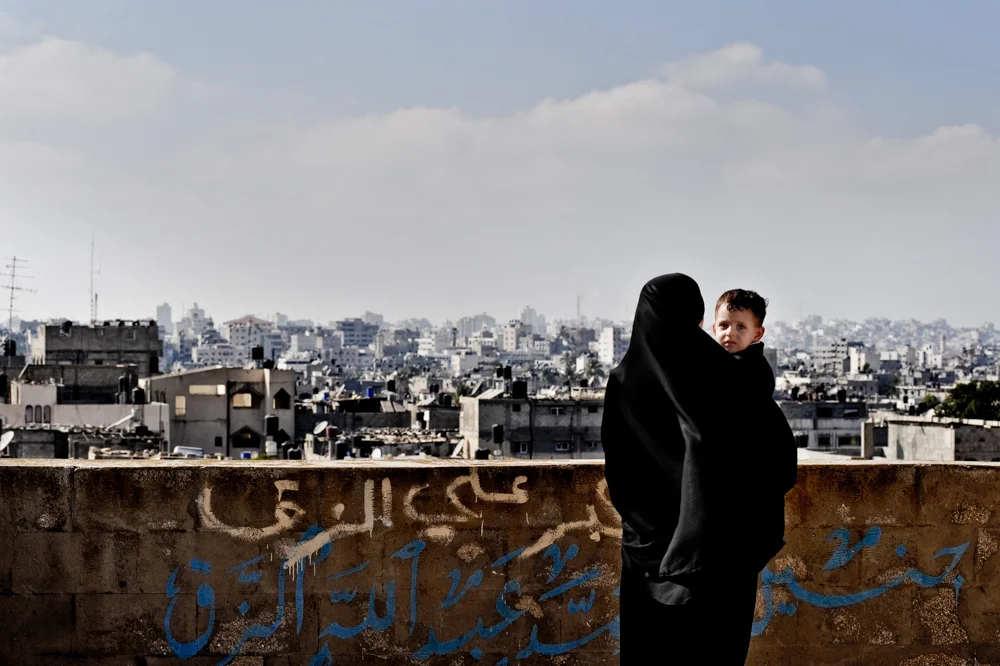

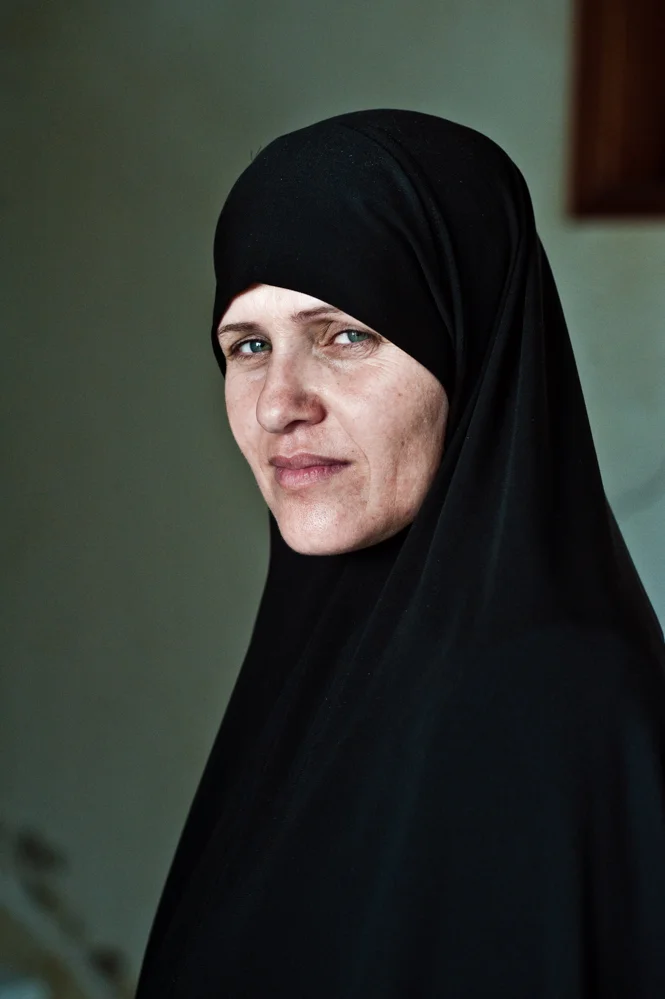
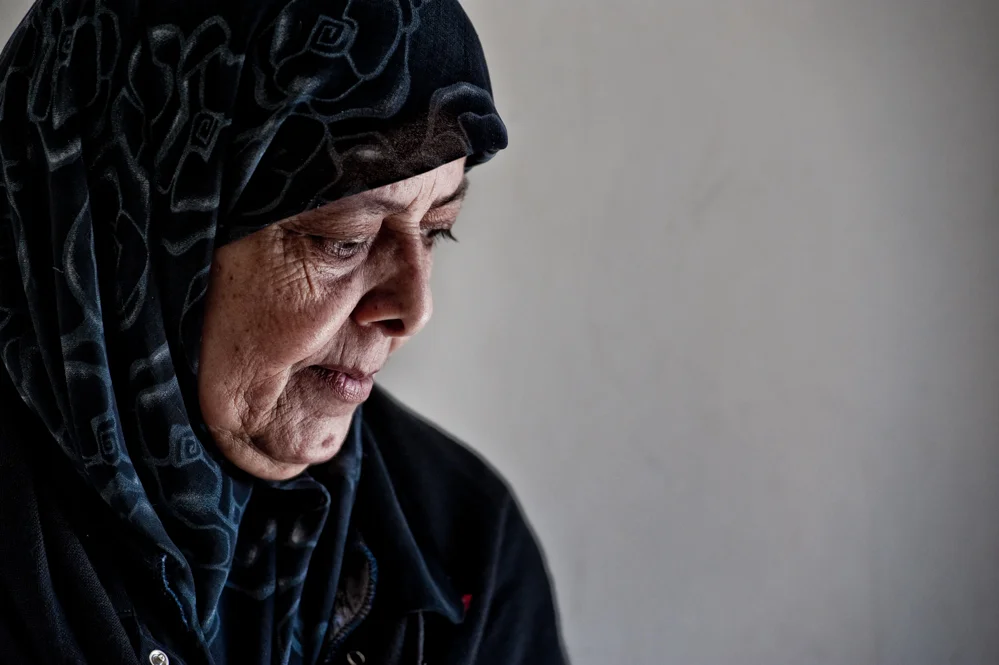
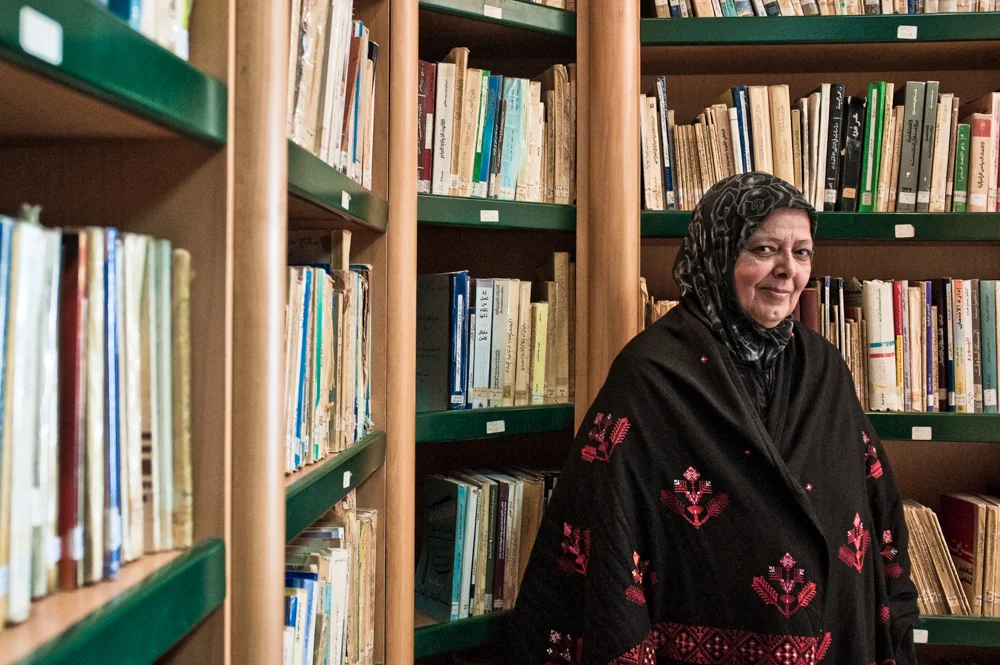

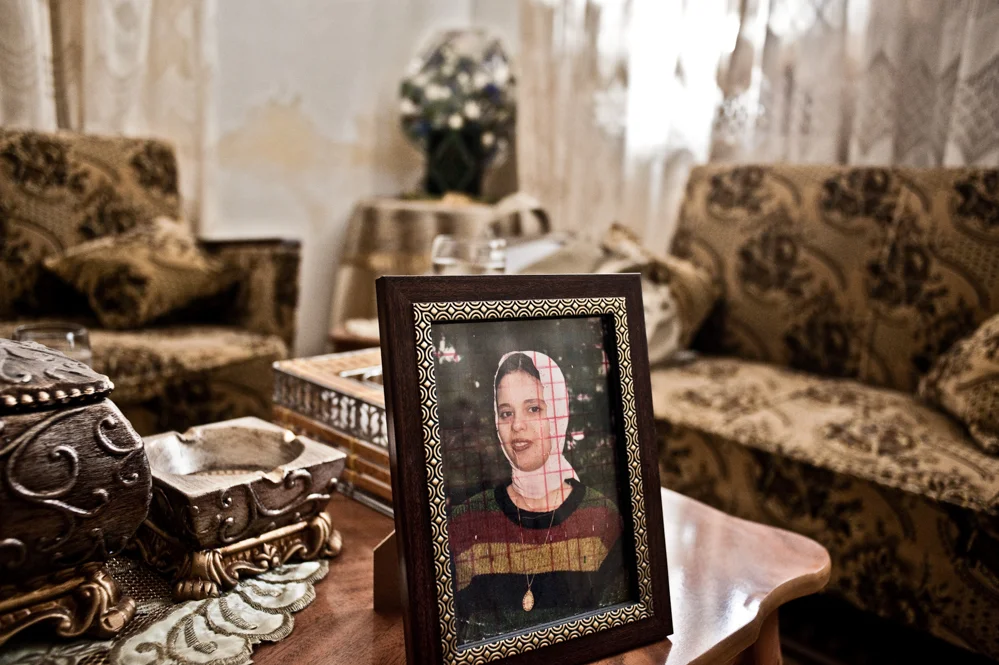


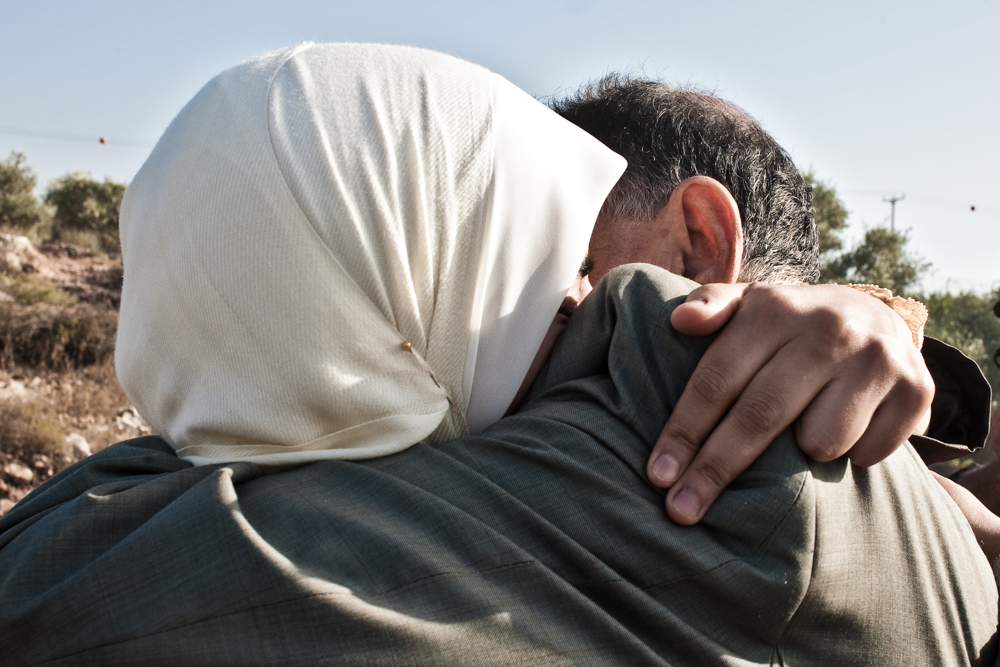
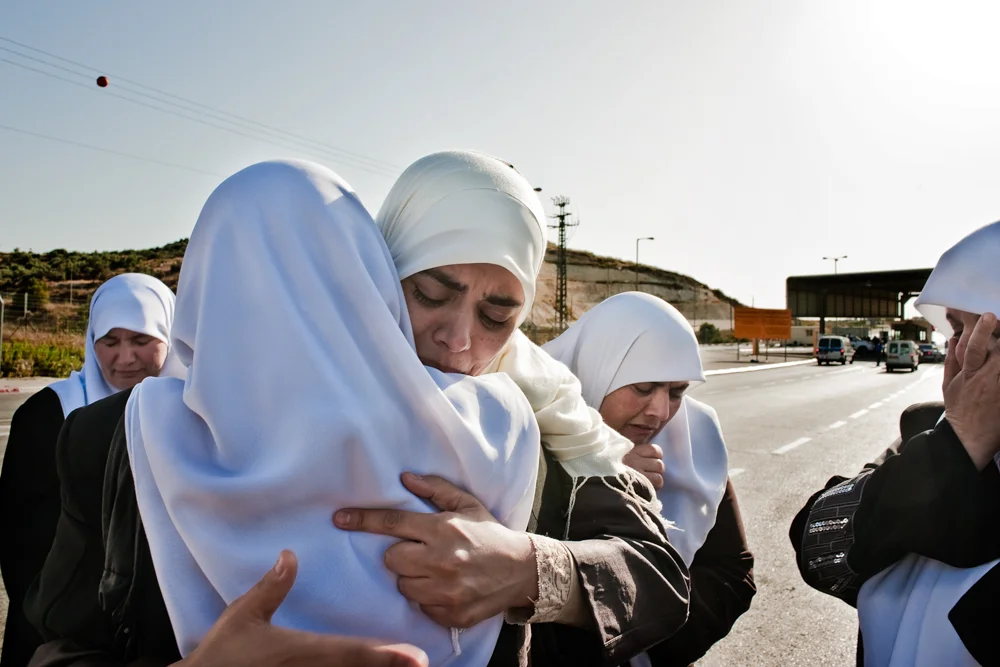




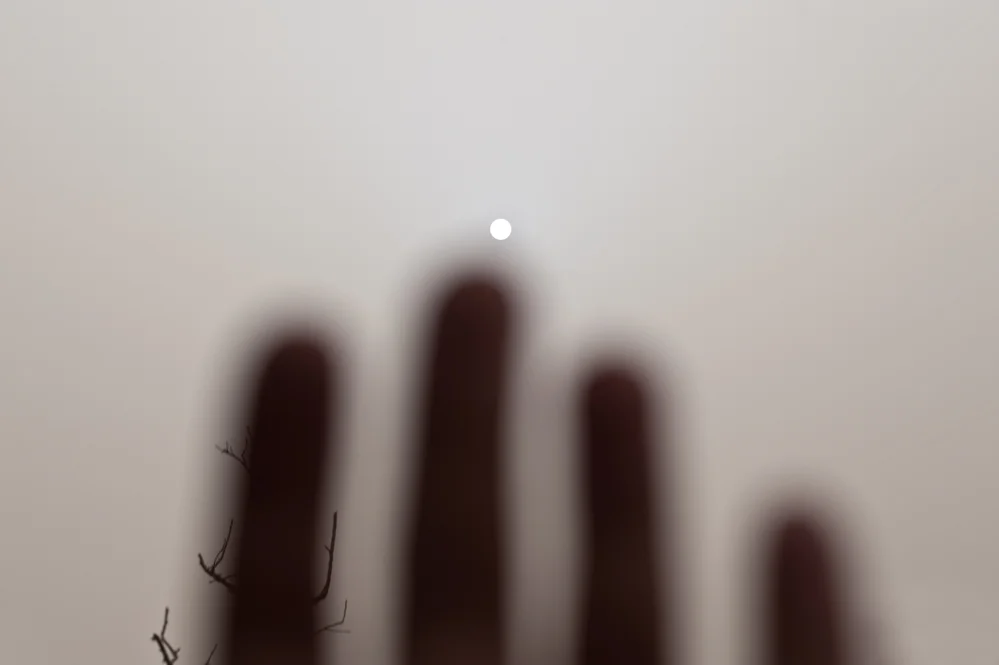
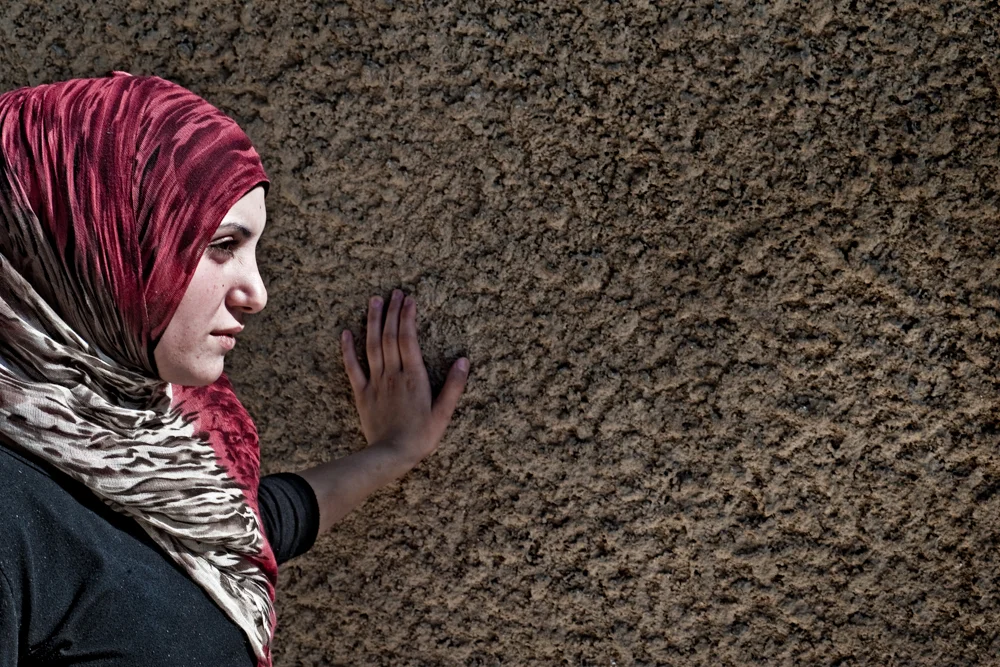
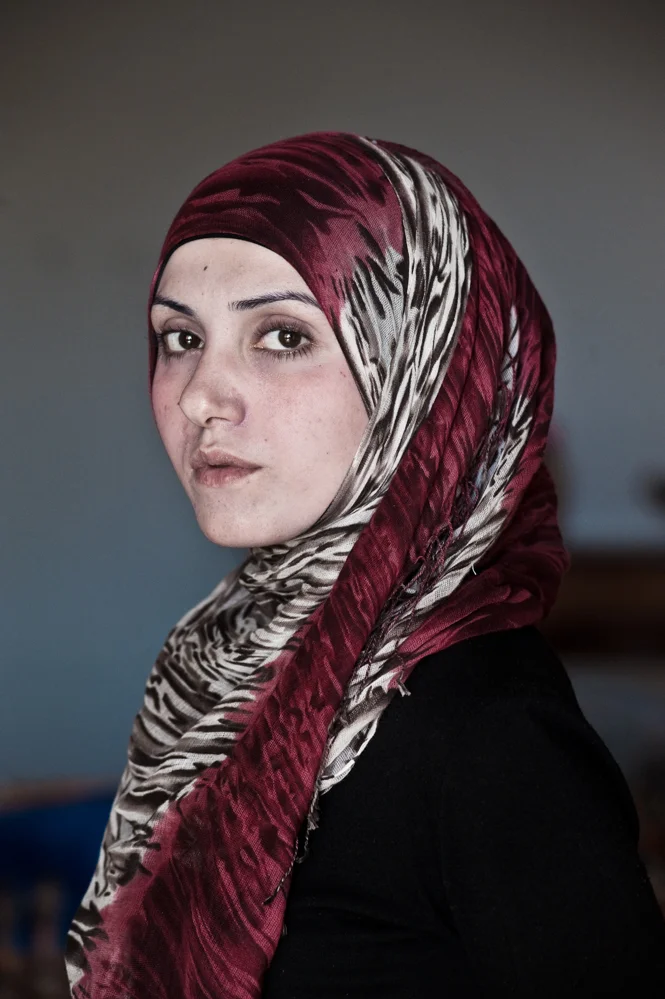

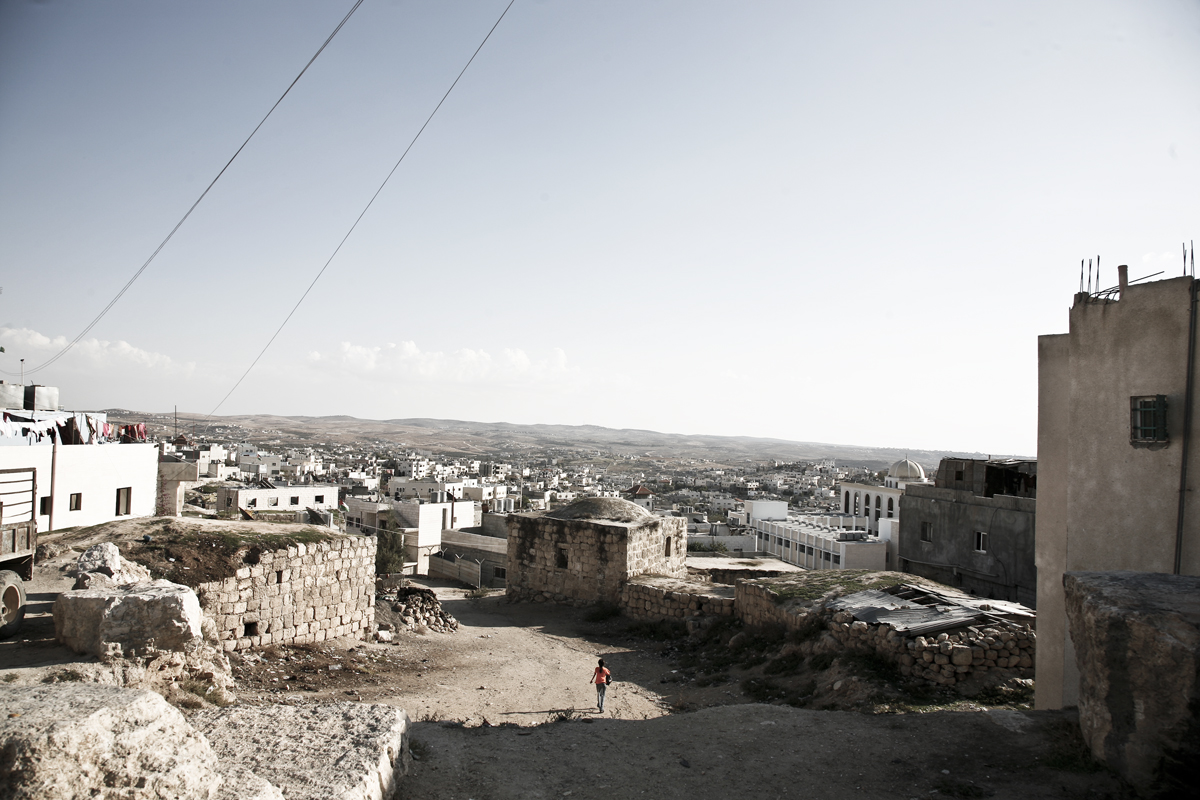
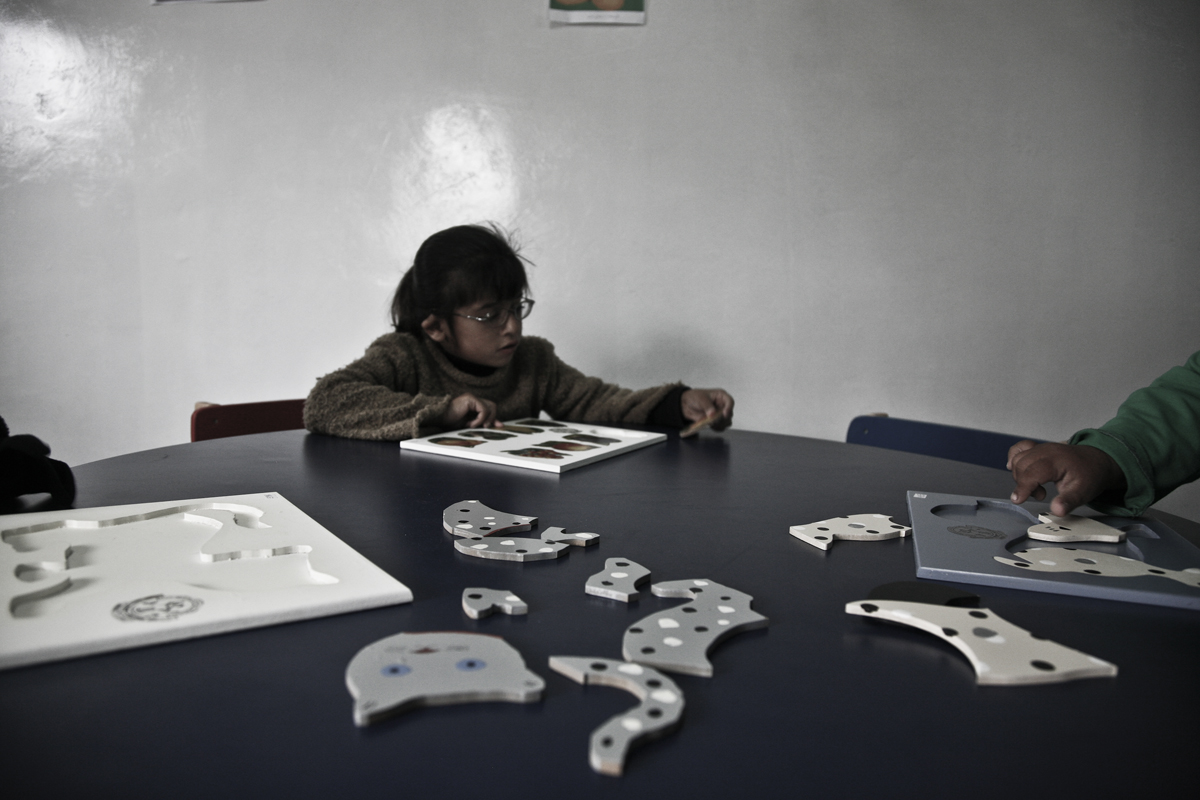




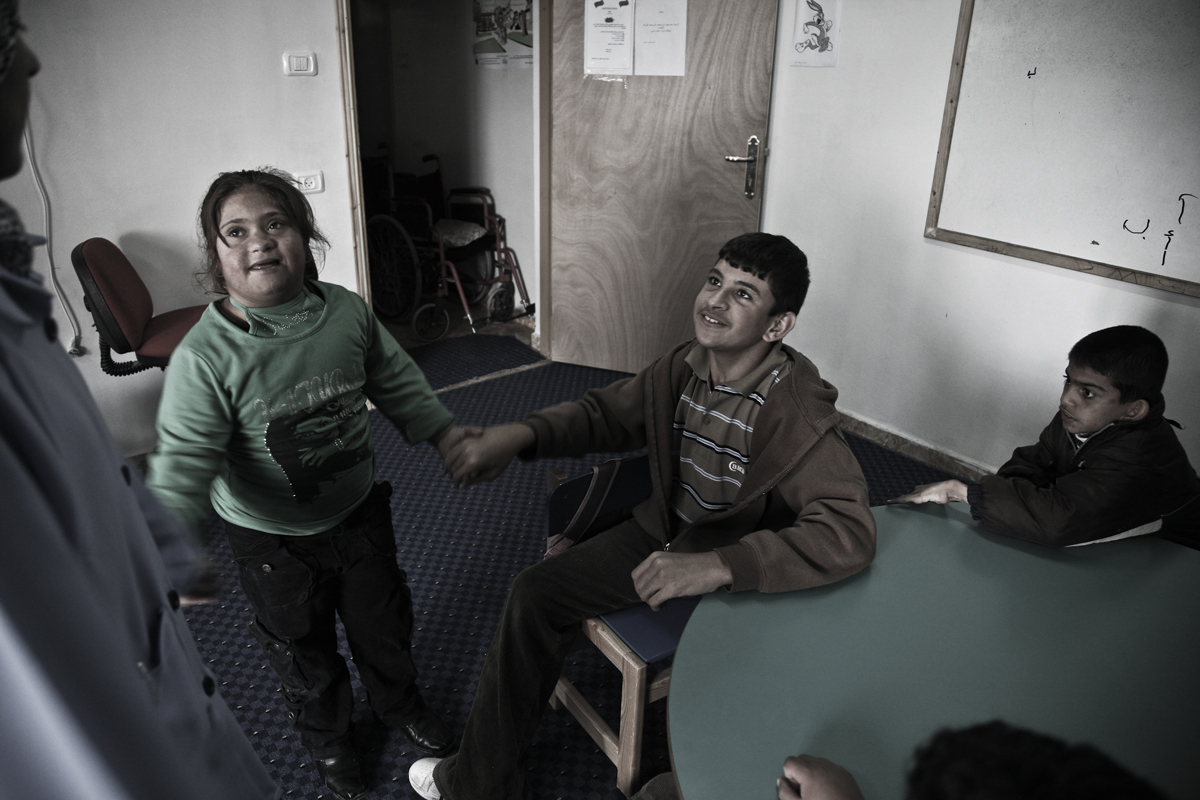
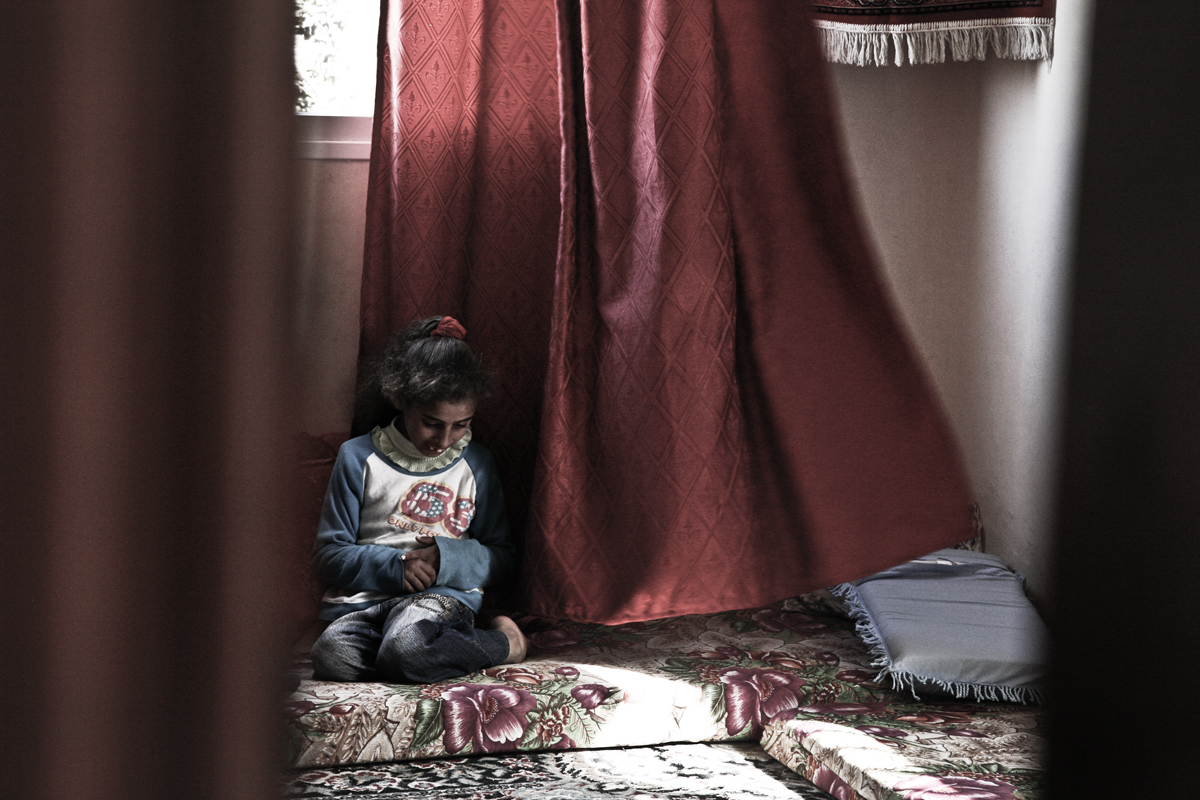
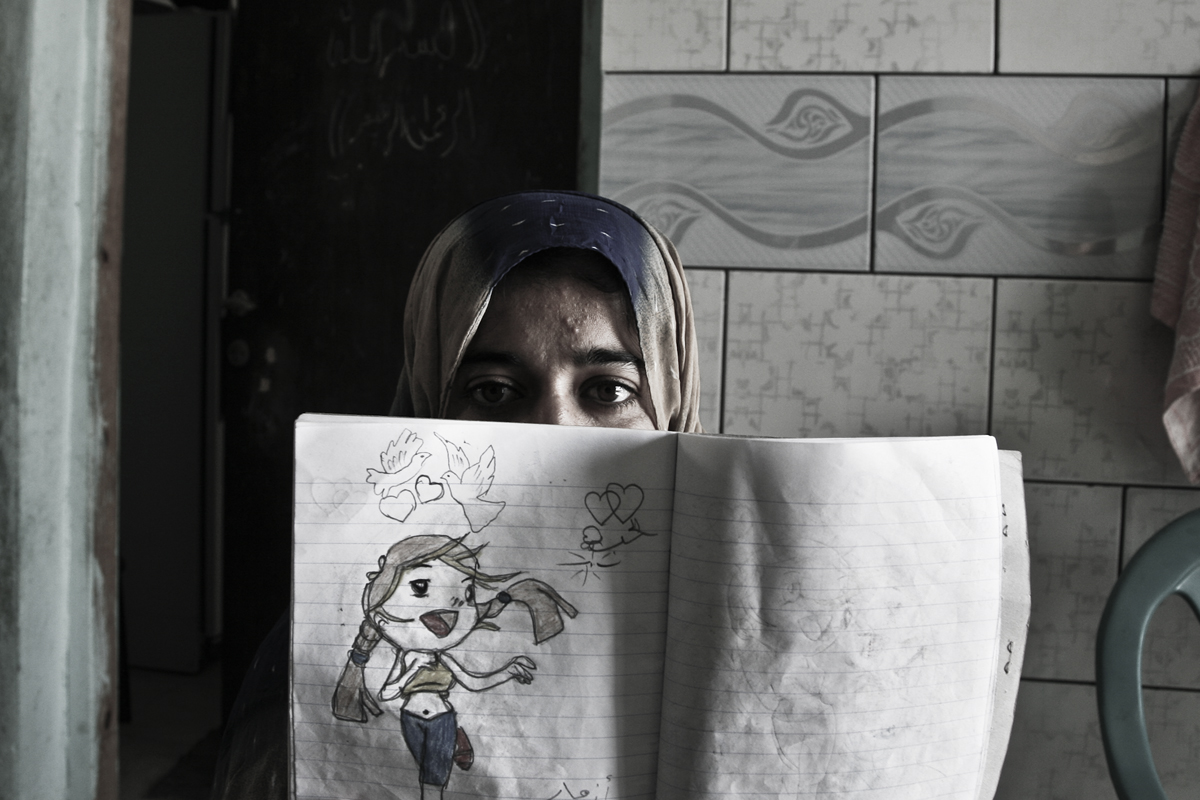
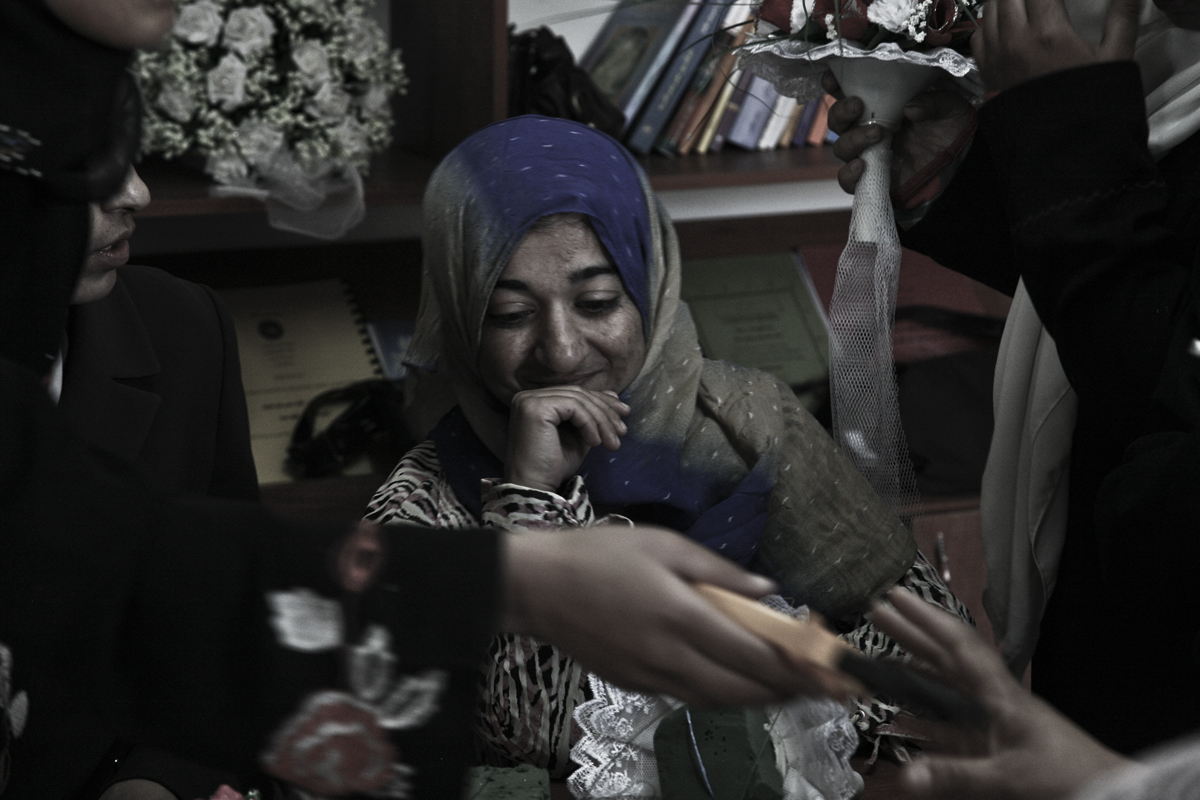
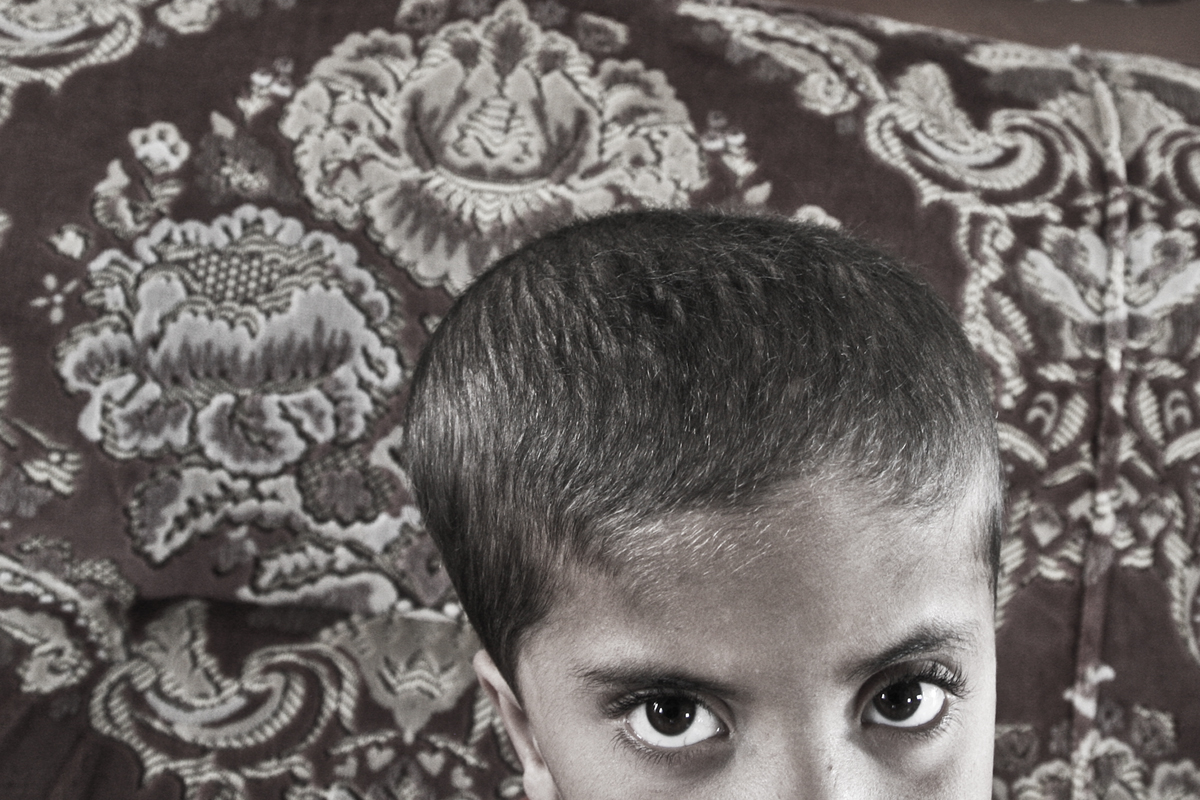
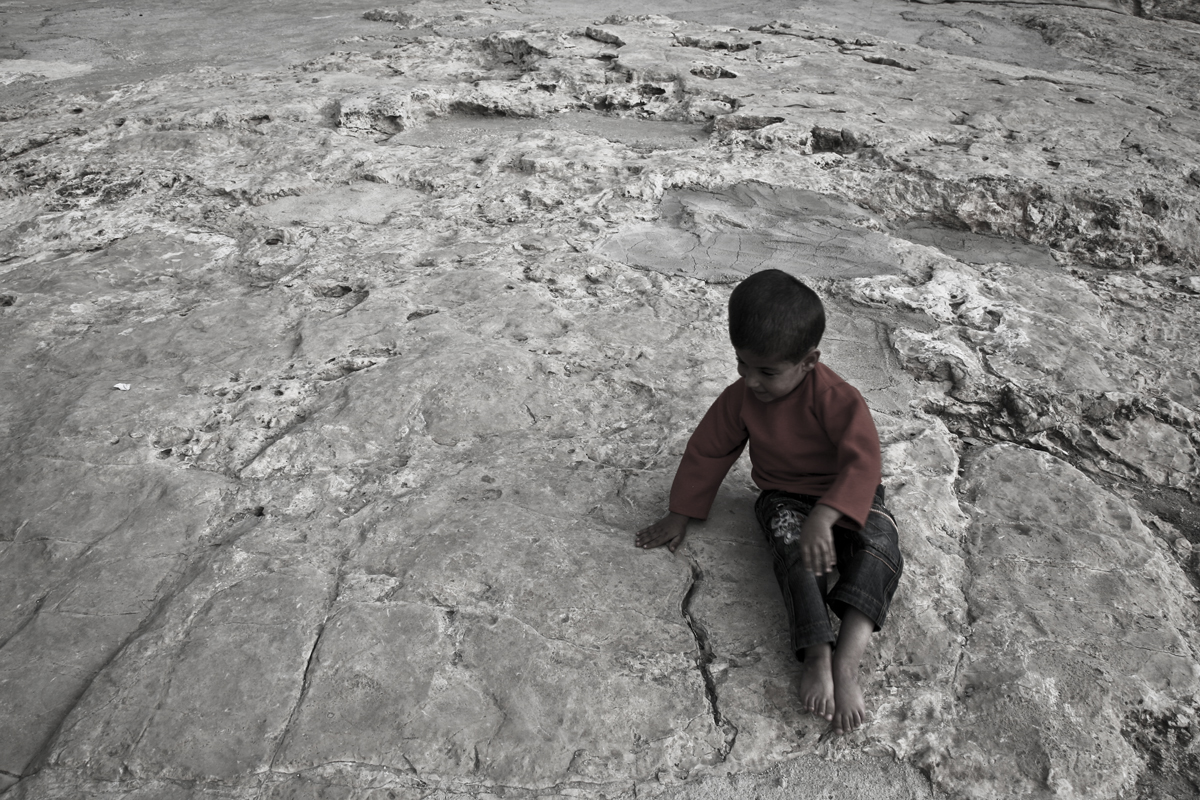


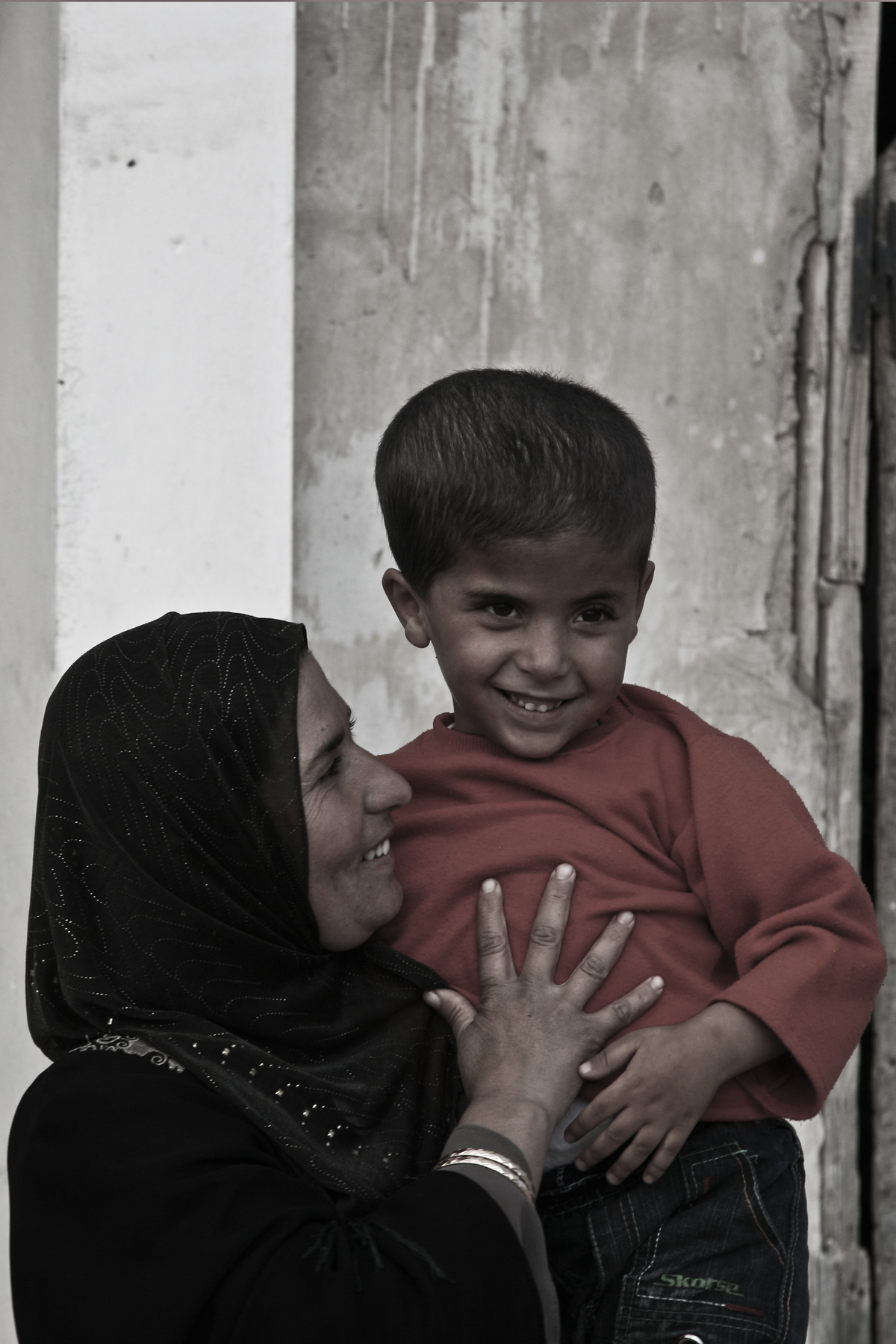
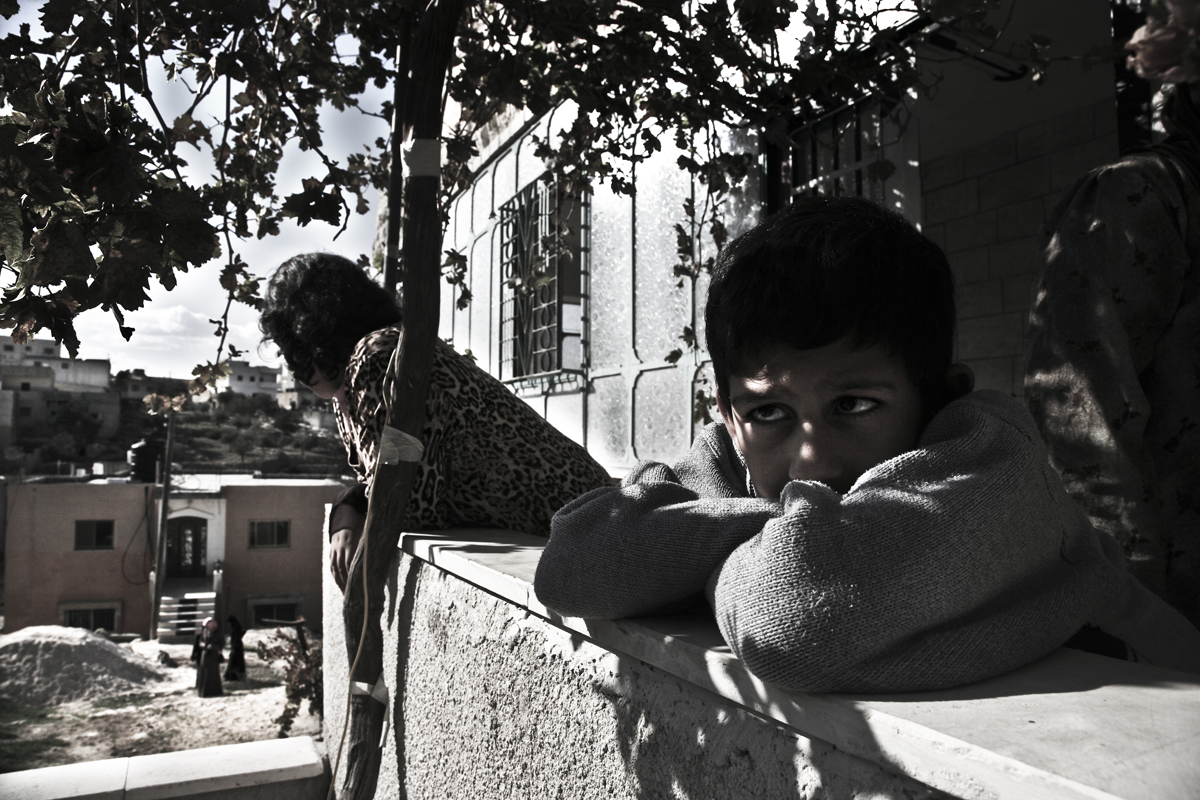





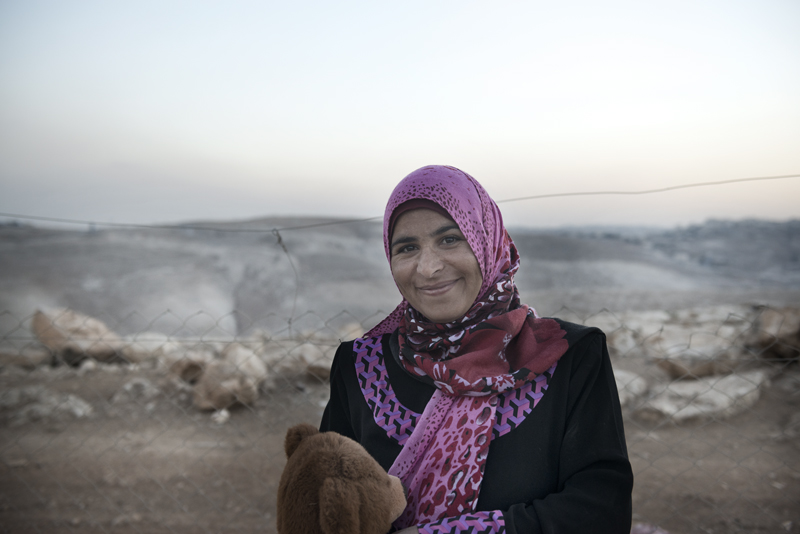





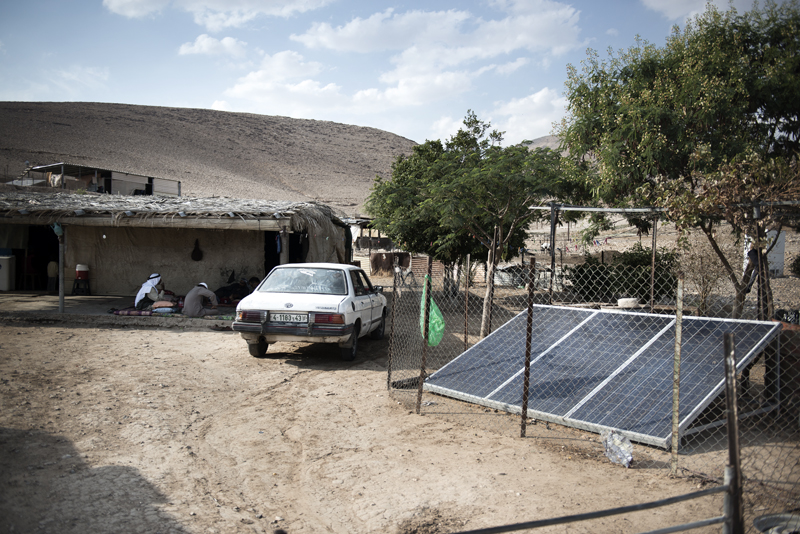
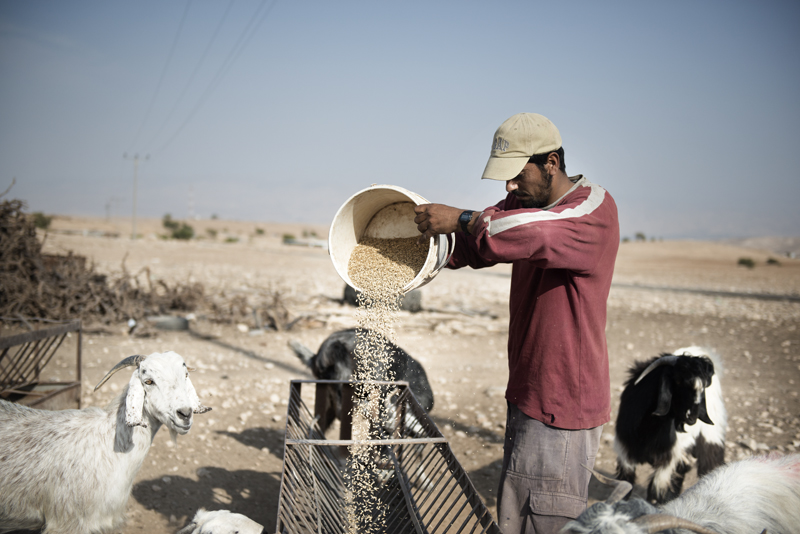
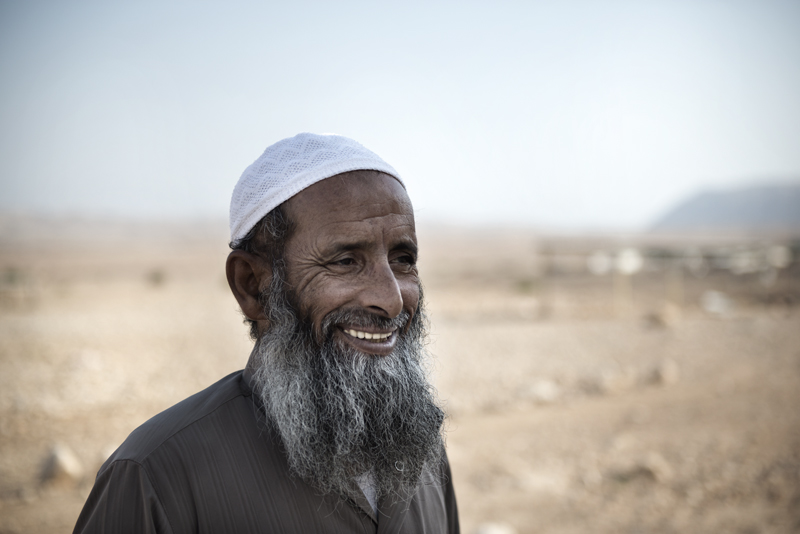








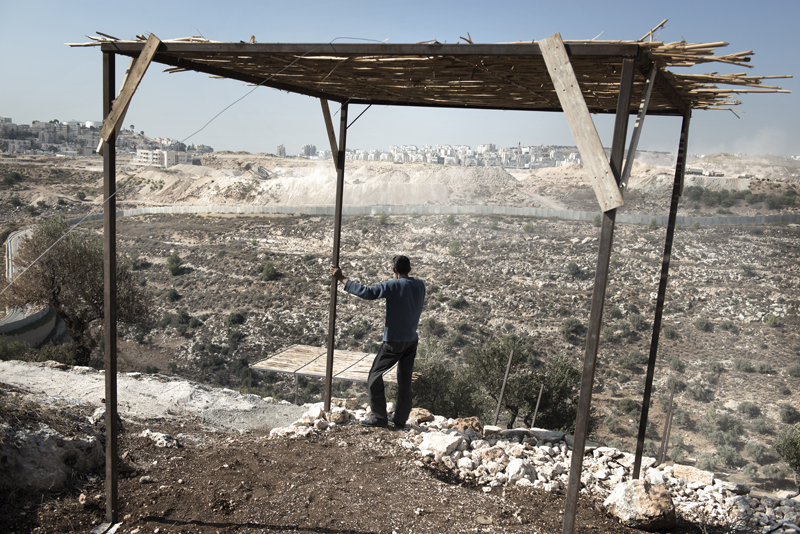

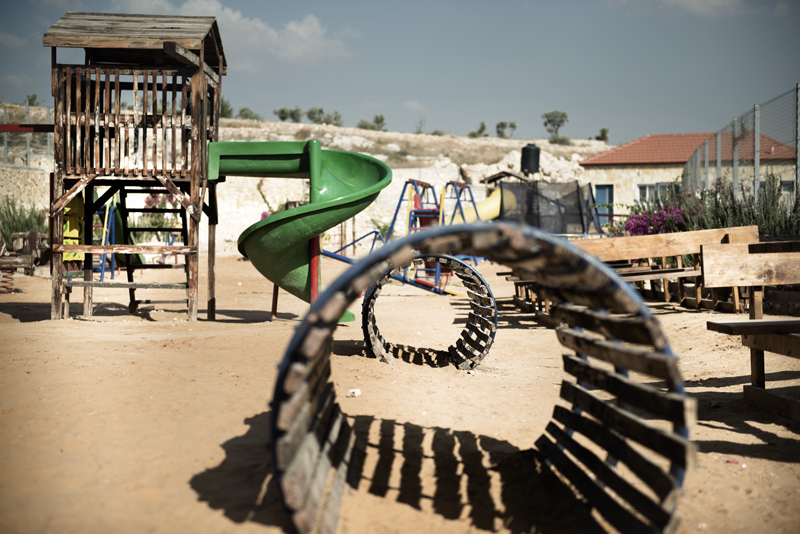





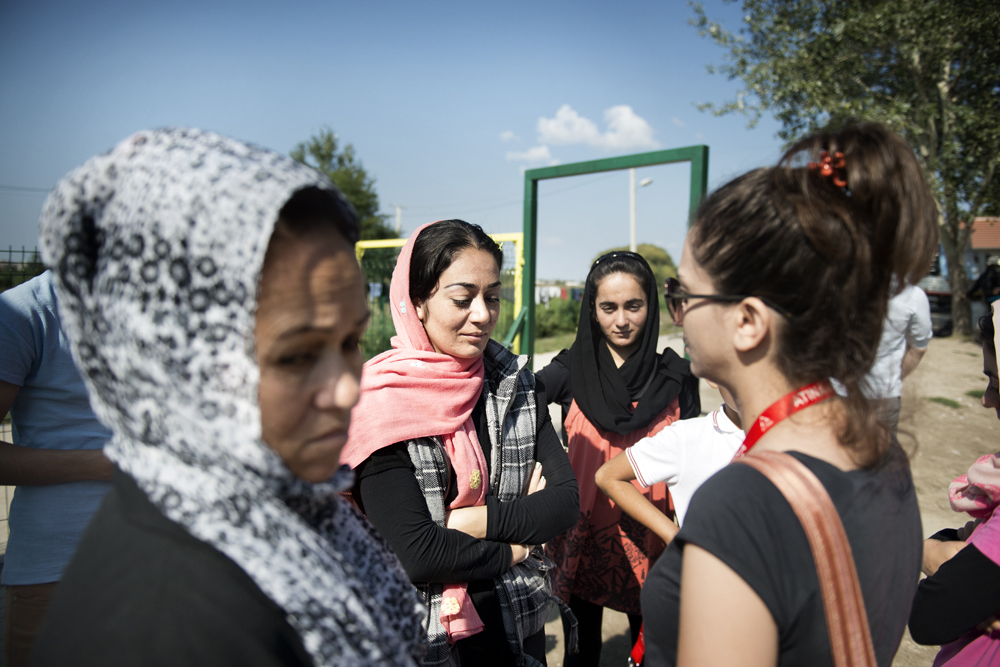

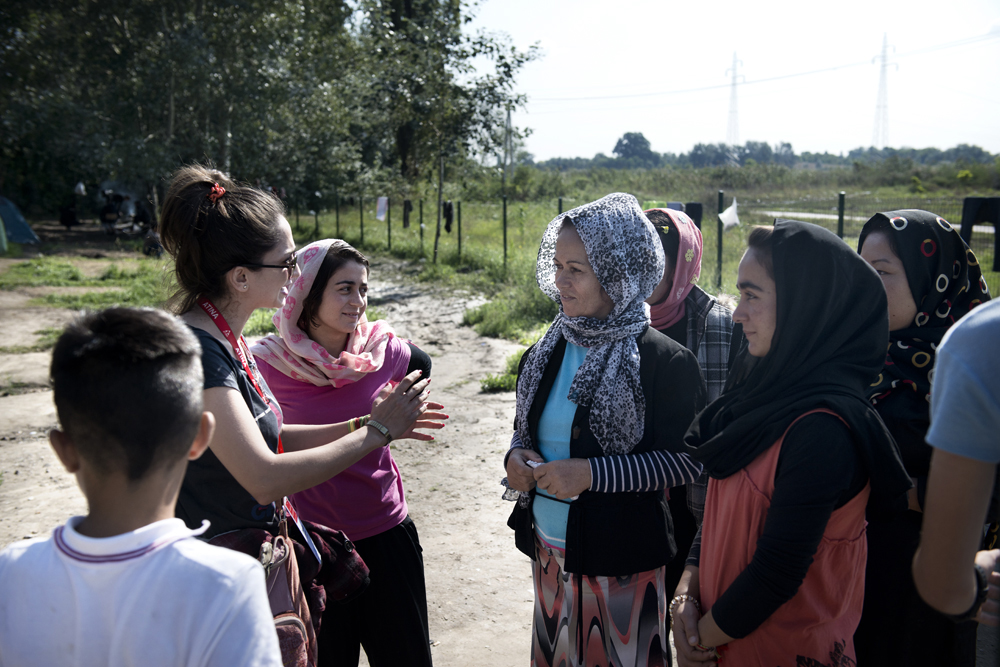






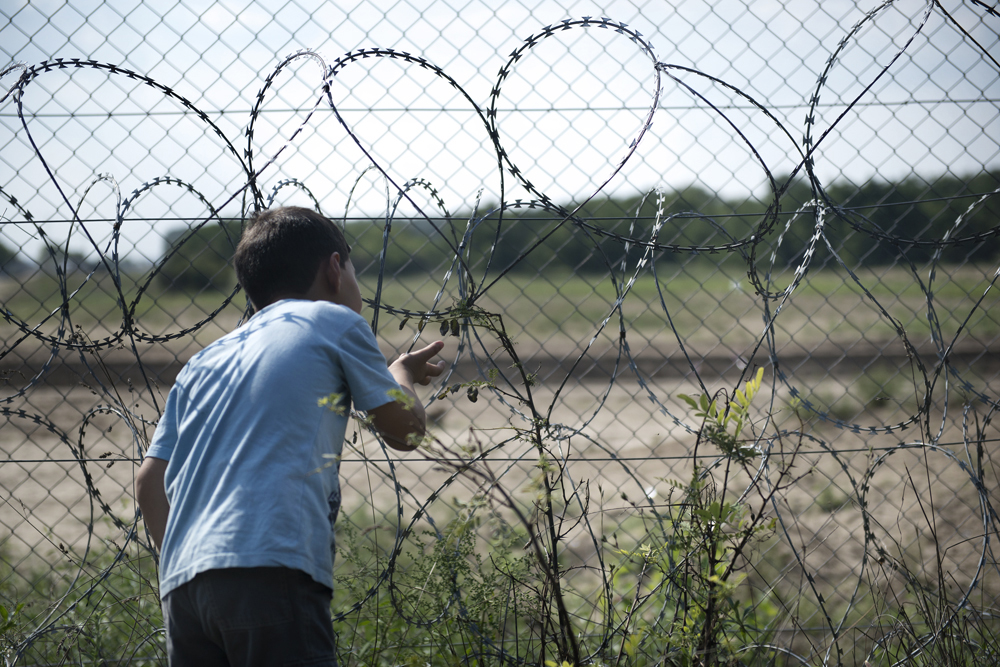







"When I was arrested, I told them that I wanted to talk to my family, to let them know. They said that they would call them. After I met my lawyers, I found out that they had not known where I was for 3 days."
"Gaza prisoners, unlike other prisoners, don’t get family visits. A person needs connection with family. Death is death but separation is harder because you’re alive and not allowed to see each other."
Fatma Al Ziq and her son Yousuf in their home in Gaza after their release.

"I gave birth on the 17th of January, a Thursday, in 2008. My suffering at the hands of the doctor started; it was as though she and I were in a battlefield with weapons pointed at each other. She insulted me at every opportunity; she kept saying: ‘go on, finish!’ I gave birth and they put Yousuf on my breast. I heard him cry and all the pain and torture I had suffered vanished. They took him away from me and immediately cuffed my hand and legs to the bed; my legs were shackled for three days. "
Fatma Al Ziq discovered that she was pregnant a few weeks after she was arrested.

Name: FATMA AL ZIQ
From: Gaza Strip
Date of birth: 30/11/1968
Age at arrest: 39 years old
Number of children and age of children when arrested: Mahmoud (19), Somayya (18), Belal (16), Sarah (14), Ali (13), Zakariya (10), Othman (7) and Sulieman (4)
Formal charge: Attempt to carry out a suicide operation
Sentence: None
Period spent in prison: 2 years and 4 months
Period of interrogation: 21 days
Time spent in detention/prison before first lawyer’s visit: 21 days
Time spent in detention/prison before first family visit: No family visits throughout detention
Family members that were not granted access: All
Time in solitary confinement: None

"I was 18 years old...They took me directly to interrogation. The interrogation area is a big yard - Palestinians call it ‘The Slaughterhouse’. As I crossed it, I saw torture tools, I saw men hanging by their feet from chains, like sheep. I heard screaming...The place was truly terrifying. "

"They beat me with clubs. I’d have my face to the wall and they would beat me on my head and back. This method was used for the entire 60 days of interrogation. They would hit us as we heard songs, very loud Israeli songs. The interrogator would stand me with my back to the wall and push his foot forcefully into my chest until I choked and my tongue hung out. For years, I complained of chest problems. Long after I left prison, they discovered a hairline fracture in my ribs."

Name: FAIROUZ ARAFA
From: Gaza Strip
Date of birth: 8/10/1948
Age at arrest(s): 22, 24 and 26 years old
Number of children and age of children when arrested: None
Formal charge: Affiliation to a Palestinian political party
Sentence: 3 and half years
Period spent in prison: 3 years
Period of interrogation: 45 days for each imprisonment
Time spent in detention/prison before first lawyer’s visit: 3 months
Time spent in detention/prison before first family visit: 3 months
Family members that were not granted access: None
Time in solitary confinement: 225 days (including 90 consecutive days)

"It was 2 am when they knocked on the door. We were sleeping. She was barefoot in her sleeping gown, they didn’t even let her put on a dress or a pair of pants, they took her and put her in the car. Dogs were barking and the army was everywhere. I tried to follow her and they aimed their guns at me, meaning to shoot me."
Nadia, mother of Dou'a

"We hired so many lawyers and tried to find out where she was. A year later we found out that she was in Ramle prison."
"When I got a permit, I went to the prison and she alone, out of all the girls, was not allowed a visit. The second time, they told me she was punished and I couldn’t see her. The third time, they let me see her for only quarter of an hour."
Nadia, mother of Dou'a

Name: DOU’A AL JAYOUSI
From: Tulkarem (West Bank)
Date of birth: 04/11/1980
Age at arrest: 22 years old
Number of children and age of children when arrested: None
Formal charge(s): Took part in and aided a suicide operation
Sentence(s): 3 life sentences and 32 years
Period spent in prison: 8 years
Period of interrogation: 2 months
Time spent in detention/prison before first lawyer’s visit: Unknown
Time spent in detention/prison before first family visit: 1 year
Family members that were not granted access: Brother and sister-in-law
Time in solitary confinement: None
(Portrait of Nadia, mother of Dou'a)

"They took away my jilbab (modest dress) and gave me their special brown prisoner uniform. It was short sleeved. I asked for something with long sleeves so I could pray, but they refused. I asked for a white long sleeved shirt that I could wear under the uniform, again they refused. I moved between cells in Jalame (detention center) among male guards in a short sleeved uniform. The thing that hurt me most were the insults they hurled at me."
Ghoufran Zamel hugs her father at the moment of her release at Jbara checkpoint.

"They arrested me at home at 2 am. I was interrogated for 35 days. The first two weeks of interrogation, I was denied access to a lawyer. Interrogation continued night and day... After two weeks they allowed me to see a lawyer and then it continued: isolation in a cell for days followed by interrogation."
Ghoufran Zamel with her sisters, at the time of her release at Jbara checkpoint.

Name: GHOUFRAN ZAMEL
From: Nablus (West Bank)
Date of birth: 28/2/1982
Age at arrest: 27 years old
Number of children and age of children when arrested: None
Formal charge: Provided services to a hostile political party (Hamas)
Sentence: 10 months
Period spent in prison: 9 months
Period of interrogation: 35 days
Time spent in detention/prison before first lawyer’s visit: 24 days
Time spent in detention/prison before first family visit: 4 months
Family members that were not granted access: Mother, brothers, sisters
Time in solitary confinement: 57 days

"Interrogation was psychological torment; hearing sounds of people being tortured, other people laughing and saying: ‘we confessed and they gave us cigarettes’. I am a smoker and they did not allow me to smoke."

"I was the only political prisoner among convicted criminals. While I was in prison, my husband divorced me and kept my son away from me. The other prisoners used to taunt me about my son."

Name: SUNA AL RA’I
From: Qalqilya (West Bank)
Date of birth: 11/12/1968
Age at arrest: 29 years old
Number of children and age of children when arrested: 1 child (4 years old)
Formal charge: Tried to shoot an Israeli soldier at Allenby Bridge (Israeli controlled border between Jordan and the West Bank)
Sentence: 12 years
Period spent in prison: 11 years and 6 months
Period of interrogation: 1 month
Time spent in detention/prison before first lawyer’s visit: 2 weeks
Time spent in detention/prison before first family visit: 5 years
Family members that were not granted access: All
Time in solitary confinement: 2 weeks

"In prison, you learn that there is always tomorrow and that as long as you breathe, you can compensate for many things that have been taken from you. One has to be positive; there are a lot of negative elements in life, why should I be one of them?"

"I was imprisoned at 16 and released at 23. I suffered deeply because I was unable to continue my education, to walk in the street, to see new people. Everything around you is motionless."
"I’ve been out for almost a year now and I’m confused... Should I pick up my life after 7 years or subtract the 7 years and start my life again at 16?"

Name: SANA ‘AMER
From: Hebron (West Bank)
Date of birth: 22/10/1986
Age at arrest: 16 years old
Number of children and age of children when arrested: None
Formal charge: Attempted stabbing of an Israeli soldier
Sentence: 7 years
Period spent in prison: 7 years
Period of interrogation: 2 months in total (several sessions of interrogation over different periods)
Time spent in detention/prison before first lawyer’s visit: Unknown
Time spent in detention/prison before first family visit: 4 years
Family members that were not granted access: None
Time in solitary confinement: Unknown

Yatta is a rural village at south of Hebron district, hard pressed by the economic crisis and the pressure of Israeli settlements who are exploiting the palestinian natural resources. In the population there are a high number of disable people, most of them are children. The situation is related with a high number of blood relationship.

Fatima Fares Jbour suffers from limited mental abilities.Fatima at the school of Disability Recourse Information Center. Yatta Hebron district.

Fatima playing in the courtyard of her house. She benefit of the school program supported by Handicap International in Yatta.

Fatima at the school of Disability Recourse Information Center. Fatima Fares Jbour suffers from limited mental abilities.

Yatta. Iyhab Mohammad Hamad Abu Sabha at his home. He suffers from combined disability formed in mobility as a result of polio in the lower half, and in the mean time he depends on wheel chair to move; also his intelligence abilities are limited.
The child joined the special education program in the Disability Recourse Information Center, and he’s capable to build good relationships especially with his colleagues, the teachers, and the employees.

Yatta. Mohammad arriving at home at home after school. He suffers from combined disability formed in mobility as a result of polio in the lower half, and in the mean time he depends on wheel chair to move; also his intelligence abilities are limited.
The child joined the special education program in the Disability Recourse Information Center, and he’s capable to build good relationships especially with his colleagues, the teachers, and the employees.

Mohammad at school of D.R.I.C. in Yatta. He suffers from combined disability formed in mobility as a result of polio in the lower half, and in the mean time he depends on wheel chair to move; also his intelligence abilities are limited.
The child joined the special education program in the Disability Recourse Information Center, and he’s capable to build good relationships especially with his colleagues, the teachers, and the employees.

Issa suffers form difficulty in communication with the surrounding environment with low mental ability. The child joined the special education program in the Disability Recourse Information Center supported by Handicap International.

Sahar showing the notebook where she use to draw and write her train of thought. Sahar suffers from distortion in the upper roof of the throat due a surgical operation was carried out for her, but the problem still existing till today. Her hearing and pronunciation abilities affected from this surgery. Sahar is one of the beneficiary of the program implemented by Handicap International in Yatta.

Naseem at his home, he is suffering from a paraplegia at the lower part of his body, as a result of the presence of water in is brain. He is a patient at the rehabilitation center supported by Handicap International in Yatta.

Naseem playing in the backyard of his home. Naseem is suffering from a paraplegia at the lower part of his body, as a result of the presence of water in is brain. He is a patient at the rehabilitation center supported by Handicap International in Yatta.

Naseem at home with his parents. He is suffering from a paraplegia at the lower part of his body, as a result of the presence of water in is brain. He is a patient at the rehabilitation center supported by Handicap International in Yatta.

Naseem with his mother. He is suffering from a paraplegia at the lower part of his body, as a result of the presence of water in is brain. He is a patient at the rehabilitation center supported by Handicap International in Yatta.

Mousa and his sister Naeemeh at their home in the outskirts of Yatta. Mousa and Naeemeh suffers from mental retardation, their disability percentage is100%.
Both of them are students in the special education class in the Information Recourses Disability Center in Yatta.

Mousa at his home in the outskirts of Yatta. Mousa and his sister Naeemeh suffers from mental retardation, their disability percentage is100%.
Both of them are students in the special education class in the Information Recourses Disability Center in Yatta.

Safa'a and Doa'a at home. Safa’a Mohammad Sulieman Dababsah age 22 and Doa’a Mohammad Sulieman Dababsah age 19. Safa’a and Doa’a are suffering from disability as a result of hereditary disease in the retina and the horny.
The disability percentage reaches 90% according to South Health Directory and General Disability Union.
Both of them take part at the formative workshop in the Information Recourses Disability Center in Yatta.

Mariam and Jihan with the children of their classroom in the kindergarden of Abu Nowar. Mariam and Jihan thanks to the support of CRDP (Community Resilience and Development Programme) were able to open a kindergarten and sewing workshop in their village Abu Nowar.

Jihan after taking a course with UNDP, become a community mobilizer. She and her friend Mariam are working as volunteer in the kindergarden. Also they are organizing otehr activity to support their community.

Mariam with the kids if the Abu Nowar kindergarten. Mariam after taking a course with UNDP, become a community mobilizer. She and her friend Gihan are working as volunteer in the kindergarden. Also they are organizing otehr activity to support their community.

Mariam, from Abu Nowar village, developed her capacities through CRDP and is now supporting her family and community.

A view of the bedouin village of Al Roshan. In the Jordan Valley the CRDP program UNDP is installing several solar panels in order to improve the resilience of the Palestinian communities living in the area.

Ali the son of Abu Kardosh his the one who is taking care of the family and the herd since his father got sick.
Bedouin village of Al Roshan; Jordan Valley.

The solar panels installed in the house of Abu Kordish. Jordan valley bedouin village of Al Korshan.
Bedouin village of Al Roshan; Jordan Valley.

Ali the son while his feeding the herd of the family. In the Jordan Valley the CRDP program UNDP is installing several solar panels in order to improve the resilience of the Palestinian communities living in the area.
Bedouin village of Al Roshan; Jordan Valley.

Musa the director of the cooperative who provide 100 families with solar panels.
Bedouin village of Al Roshan; Jordan Valley.

Fatima the mother of Amenh Al Shaer with her niece in the garden of his house. Amenh Al Shaer is one of the beneficiary treating wastewater system installed by UNDP in Tuqu'.

The irrigation system that carry the recycled water from the system in the house of Amenh Al Shaer, one of the beneficiary of the treating wastewater system installed by UNDP in Tuqu'. Bethlehem district.

A member of ARIJ checking the recicling system in the house of Amenh Al Shaer, one of the beneficiary of the treating wastewater system installed by UNDP in Tuqu'. Bethlehem district.

A murales in the village of Bil'in. Bil'in became famous for his pacific resistance against the settlement of Modi'in.
UNDP is supporting the construction of a park on the land that is been returned by the Israeli government.

The under construction cafe in the park facing the Israeli Modi'in settlement.
UNDP is supporting the construction of a park on the land that is been returned by the Israeli government. Bil'in; West Bank.

Bil'in became famous for his pacific resistance against the settlement of Modi'in.
UNDP is supporting the construction of a park on the land that is been returned by the Israeli government. Bil'in; West Bank.

Sadiq, a farmer from Khirbet Jbara pumping water at his residence further to CRDP’s intervention.
Village of Jbara; West Bank.

Mustafa Aboushi local concil member and part of water well committee, picking guava. With the CRDP's intervention, the member of this community have been able to switch the pumping power system from diesel to electricity allowing them to produce more cubic meters of water per hour at a considerable lower cost then before.
Jbara; West Bank

Mohammad, a member of the Jbara community, praying in Mosque of the village.
With the CRDP's intervention, the member of this community have been able to switch the pumping power system from diesel to electricity allowing them to produce more cubic meters of water per hour at a considerable lower cost then before.
Jbara; West Bank

A refugee from Afghanistan runs to greet cultural mediator and Farsi translator Zizi from the Atina outreach team, at Subotica Transit Centre in Serbia.

Cultural mediator and Farsi translator Zizi from the Atina outreach team speaks with women at Subotica Transit Centre in Serbia.

Cultural mediator and Farsi translator Zizi from the Atina outreach team speaks with women at Subotica Transit Centre in Serbia.

Cultural mediator and Arabic translator Hasan Isamil and social worker Zorana Parezanovic from the Atina mobile outreach team speak with women at Subotica Transit Centre in Serbia.

Men’s food distribution queue at Subotica Transit Centre in Serbia. There is a separate distribution point for women and children.

Refugees stay in an informal camp at the Kelebija border crossing waiting to be allowed to cross into Hungary. The Atina mobile outreach team tries to identify the most vulnerable people: women travelling alone or with children. With support of UN Women, they try to provide assistance and counselling and make assessments regarding gender-based violence.

Refugees stay in an informal camp at the Kelebija border crossing waiting to be allowed to cross into Hungary. The Atina mobile outreach team tries to identify the most vulnerable people: women travelling alone or with children. With support of UN Women, they try to provide assistance and counselling and make assessments regarding gender-based violence.

Refugees stay in an informal camp at the Kelebija border crossing waiting to be allowed to cross into Hungary. The Atina mobile outreach team tries to identify the most vulnerable people: women travelling alone or with children. With support of UN Women, they try to provide assistance and counselling and make assessments regarding gender-based violence.

Refugees stay in an informal camp at the Kelebija border crossing waiting to be allowed to cross into Hungary. The Atina mobile outreach team tries to identify the most vulnerable people: women travelling alone or with children. With support of UN Women, they try to provide assistance and counselling and make assessments regarding gender-based violence.

Cultural mediator and Arabic translator Hasan and social worker Zorana from the Atina mobile outreach team speak with refugees at the Kelebija border crossing in Serbia.

Zorana from the Atina mobile outreach team with refugee girl at the Kelebija border crossing in Serbia.

Refugees stay in an informal camp at the Kelebija border crossing waiting to be allowed to cross into Hungary. The Atina mobile outreach team tries to identify the most vulnerable people: women travelling alone or with children. With support of UN Women, they try to provide assistance and counselling and make assessments regarding gender-based violence

Refugees stay in an informal camp at the Kelebija border crossing waiting to be allowed to cross into Hungary. The Atina mobile outreach team tries to identify the most vulnerable people: women travelling alone or with children. With support of UN Women, they try to provide assistance and counselling and make assessments regarding gender-based violence.